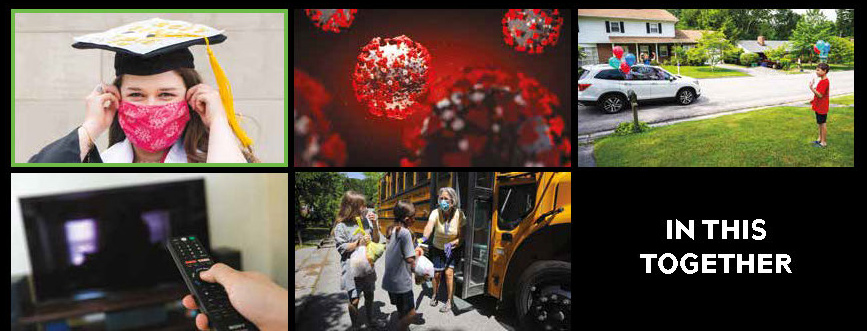By Travis Williams and Mason Adams
See Ten ways Virginia Tech Faculty and Students Got Creative
When circumstances change, challenges arise, and calls for assistance go out, Virginia Tech leans into its motto, Ut Prosim (That I May Serve).
The emergence of the novel coronavirus has presented such an occasion. The pandemic required a pivot from norms, the acceleration of technological advancements, and a level of personal responsibility that has surpassed anything most Americans have previously experienced.
The Virginia Tech community is responding to this moment in quintessential Hokie fashion, confirming the real-world benefits of the university’s hands-on approach to learning, as well as the steadfast nature of the Hokie bond—and most importantly, seizing the opportunity to collectively live out our motto.
IN MAY, BRYCE KORABIK FULFILLED A DREAM.
A member of Virginia Tech’s Class of 2020, the mechanical engineering major donned his official university cap and gown, and as the notes of “Pomp and Circumstance” began to play, took the first steps of a long-awaited graduation march.
Korabik’s path led down a driveway and up a short flight of stairs to the neighbor’s front porch, which was now doubling as a stage. There, in a yard in a Cary, North Carolina, neighborhood, friends and family gathered at a safe distance for the heartfelt, makeshift ceremony that lasted less than five minutes.
“It was a wonderful way to celebrate in a nontraditional way, in what’s not a normal year for graduations,” said Cindy Korabik, Bryce’s mom.
Across Hokie Nation, such creative celebrations became the norm following a semester that had been upended due to the COVID-19 pandemic. Shortly after spring break, all Virginia Tech coursework, most research, and a semblance of social life shifted to virtual platforms as students, faculty, and the broader university community took steps to comply with guidelines intended to mitigate the virus.
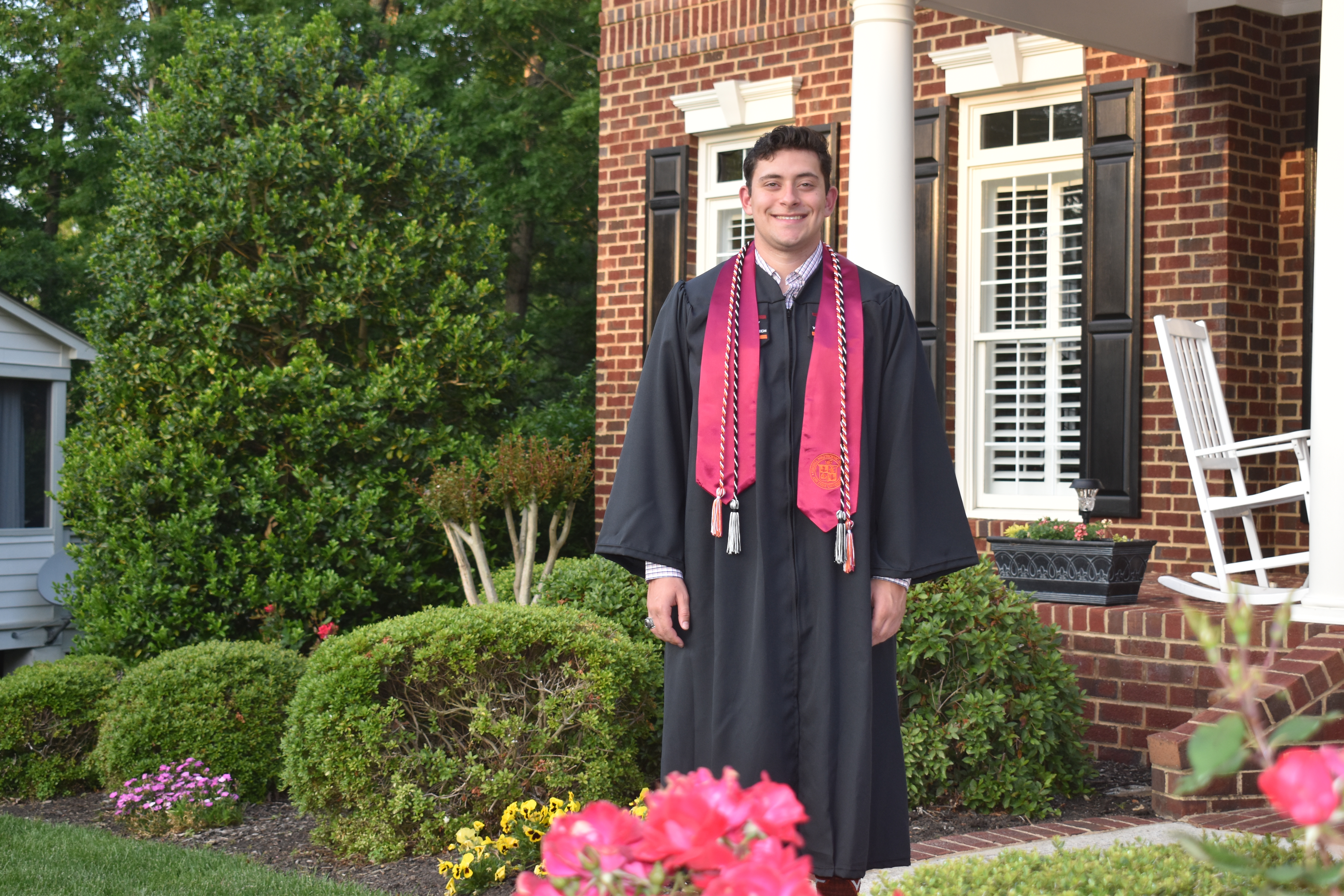
Bryce Korabik
Members of the junior class would miss their long-awaited ring dance, and for seniors, Virginia’s restrictions on gatherings would upset traditional graduation events, up to and including the Lane Stadium commencement ceremony.
Crisis is an extraordinarily authentic test.
As the novel coronavirus spread, the pandemic resulted in an unanticipated examination that elevated strengths, revealed weaknesses, and served as a compass for directing change or reinforcing the trajectory of an already established vision.
Responding to the virus demanded the best of people, and as a global land-grant university dedicated to the ethos of Ut Prosim (That I May Serve), Virginia Tech answered the call.
COVID-19 and the resulting quarantine measures called for thoughtful self-evaluation, a shift away from longstanding practices, and the acceleration of alternative solutions for academic outreach and other priorities that were, until spring, in largely developmental phases. The response also ushered in a moment of opportunity, creating a challenge to which Hokies successfully rose.
Responding to COVID-19 affirmed the real-world benefits of Virginia Tech’s team-oriented, experiential approach to learning, as well as confirming the steadfast nature of the Hokie bond. The unprecedented moment presented another chance to do what Hokies do best: to serve our communities, our nations, and our world.
“There are many examples of how the Virginia Tech community stepped up when needed,” said President Tim Sands during one of multiple virtual town halls held since March to keep the Hokie community informed. “The contributions of essential employees who remained on campus, the application of Virginia Tech’s world-class expertise to help the public better understand this disease, and the care for each other that sustained us through these difficult months make us proud to be Hokies.”
EARLY CHALLENGES
As university groups began meeting to consider the potential implications of COVID-19 in late January, global travel was among the primary concerns. About 400 students and faculty members were abroad at the time, and as they returned home, and the virus spread, the university’s focus shifted to domestic issues.
The university’s Incident Management Team (IMT) scheduled a quick briefing on the topic for the first week in March, but the rapidly evolving situation prompted the group to shift from discussion to action. On March 11, President Sands announced a six-day spring break extension to facilitate the move to online learning for the remainder of the semester.
That online pivot required a monumental, rapid transition to remote study led by Virginia Tech faculty and staff, some of whom had never before taught online classes.
“Our faculty’s hard work, collaborative spirit, and relentless innovation enabled it to overcome this difficult challenge,” said Executive Vice President and Provost Cyril Clarke. “Their efforts enabled Virginia Tech to protect the health and safety of our community, while sustaining our core educational, research, and outreach programs. This was clearly not what we thought we would be doing at the start of the semester, but I’ve been impressed by our faculty’s resilience and ability to thrive even under challenging circumstances.”
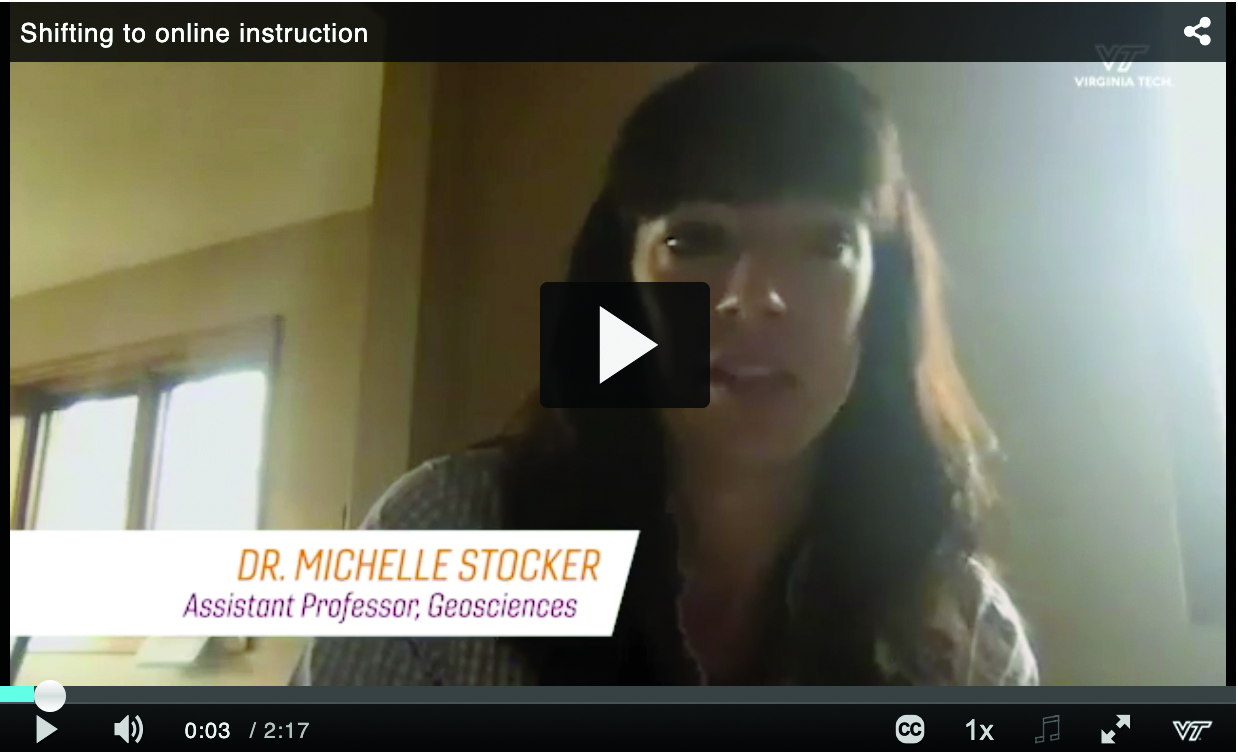
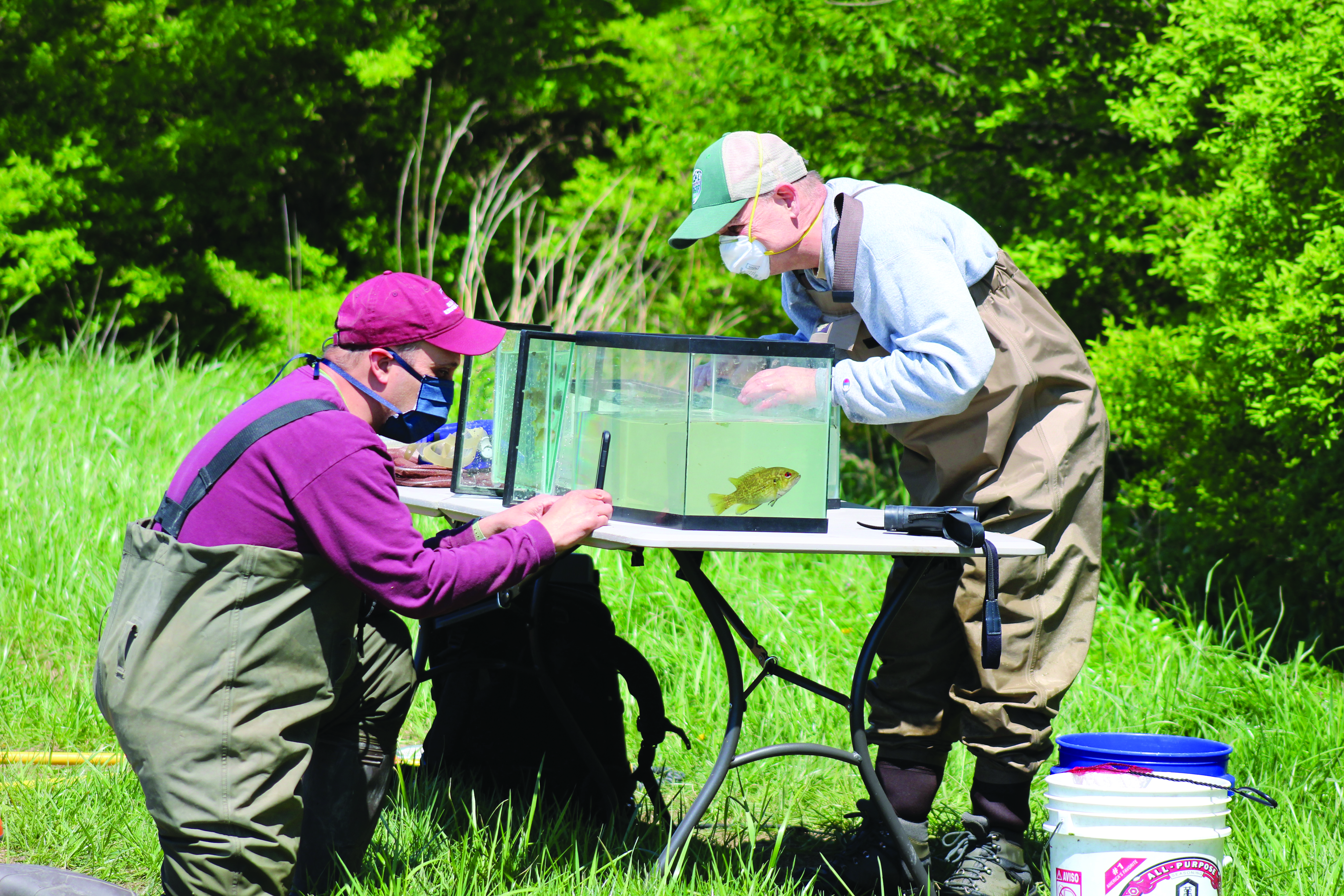
ONLINE LEARNING
By March 23, 2020, nearly 2,400 instructors were teaching approximately 4,500 classes remotely, leaving empty classrooms in buildings across campus. For Michelle Stocker, assistant professor of geobiology (top), that meant moving fossils and skeletons used during instruction to her home. Kevin Hamed, assistant professor in the Department of Fish and Wildlife Conservation (in maroon), and Mike Pinder of the Virginia Department of Game and Inland Fisheries (in blue), worked with students to test fish identification skills virtually (center).
The move to online education, the transition to telework for most university offices, and later decisions that would necessitate a shift to essential services prompted significant operational changes as well.
“The people who carry out the work of Virginia Tech responded nimbly in the face of an uncertain situation,” said Dwayne Pinkney, senior vice president and chief business officer. “Their perseverance and steadfast commitment to our shared mission enabled the university to respond quickly and efficiently during a trying time.”
Virginia Tech’s IMT, which consists of about 25 representatives from academics and athletics to law enforcement and human resources who train regularly to handle large-scale campus emergencies, essentially steered the ship as the university navigated unknown waters. The team has worked together consistently since March—the longest span it’s ever been activated—to ensure faculty, staff, and students remain safe, education and research continue, and Ut Prosim is at the forefront of every decision.
“The team is made of those who are the doers,” said Michael Mulhare, Virginia Tech’s assistant vice president for emergency management. “We’re tasked with making policy decisions operational.”
The IMT credited the quick and efficient transition to remote learning in part to technology, specifically noting the use of a software that had been under development for about six years that included a variety of enhanced features, such as shareable dashboards with real-time metrics.
As the university scaled back operations, the IMT was tasked with transitioning a variety of critical services and reorganizing the responsibilities of dedicated essential employees, including those in mail services, which faced a handful of special challenges. Because buildings were locked, commercial drivers delivered departmental packages to a centralized location. With about 600 packages arriving each week, mail services employees worked alongside security personnel to access buildings for mail distribution about twice weekly.
Steve Vantine, interim director of mail services, said employees normally assigned to other departments, such as parking services, migrated over to increase the total workforce to about 25 people. The team worked in two separate shifts to mitigate the potential for an outbreak of the virus.
“The whole operation goes down if one person comes down with COVID,” Vantine said.
The mail team needed to develop processes to manage not only the high quantity of deliveries, but also those requiring special care, such as packages containing perishables or those needing refrigeration, as well as rerouting items that had been shipped to students who were no longer on campus. For the latter, Vantine said the university covered the expense to forward the packages.
The once-bustling campus, now devoid of students, faculty, and staff, resembled the setting for a dystopian novel where time simply stopped. Although for most, the quiet grounds appeared to mourn the missing students and faculty, for some, the now-empty buildings created opportunities to get a head start on year-end tasks. The university’s facilities department, for example, initiated their detailed cleaning of high-traffic areas and added touch-free dispensers for soap and paper towels, as well as 2,000 new hand-sanitizer stations and several misting machines in 65-plus buildings, said Jarrod Alls, facilities quality control assistant.
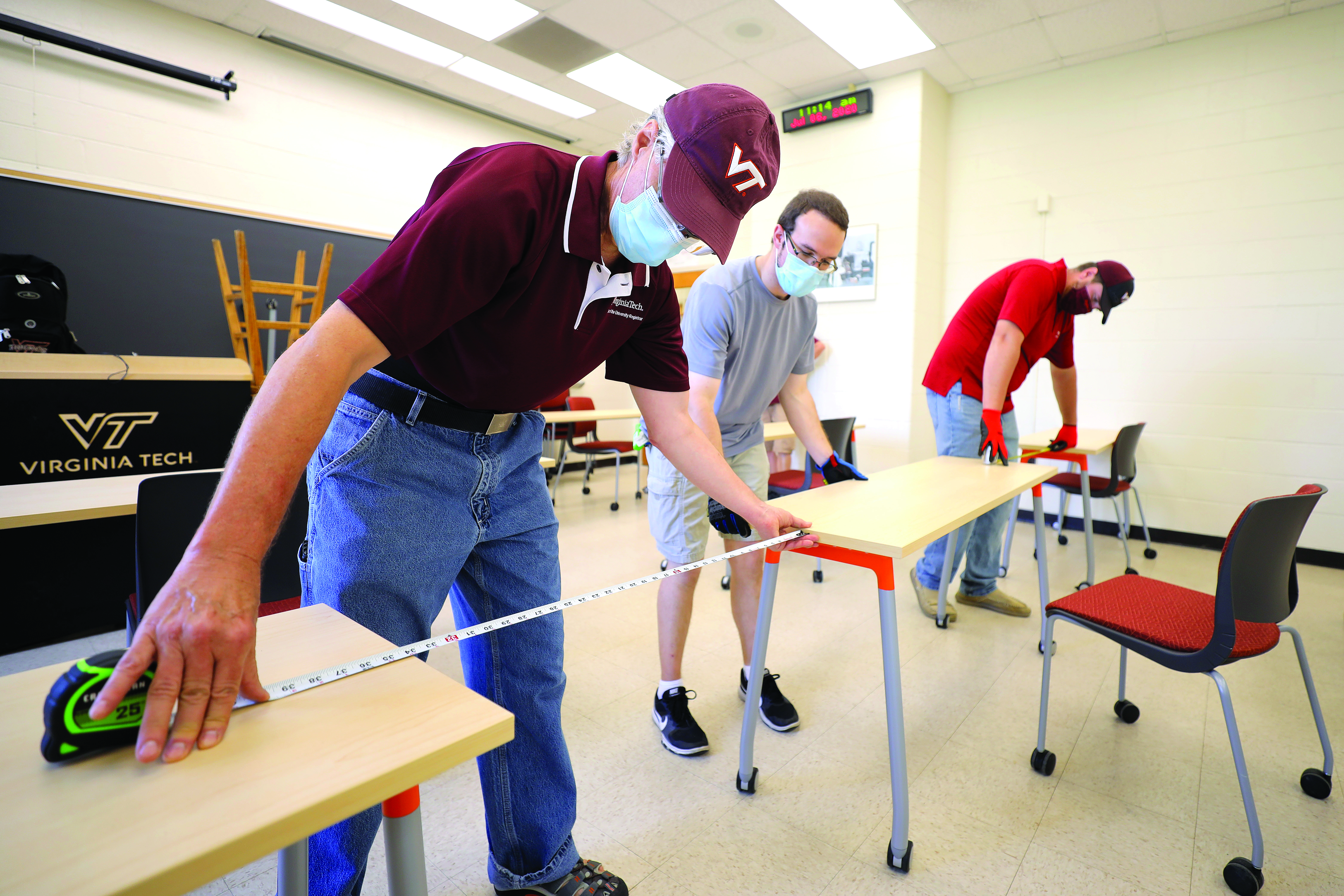
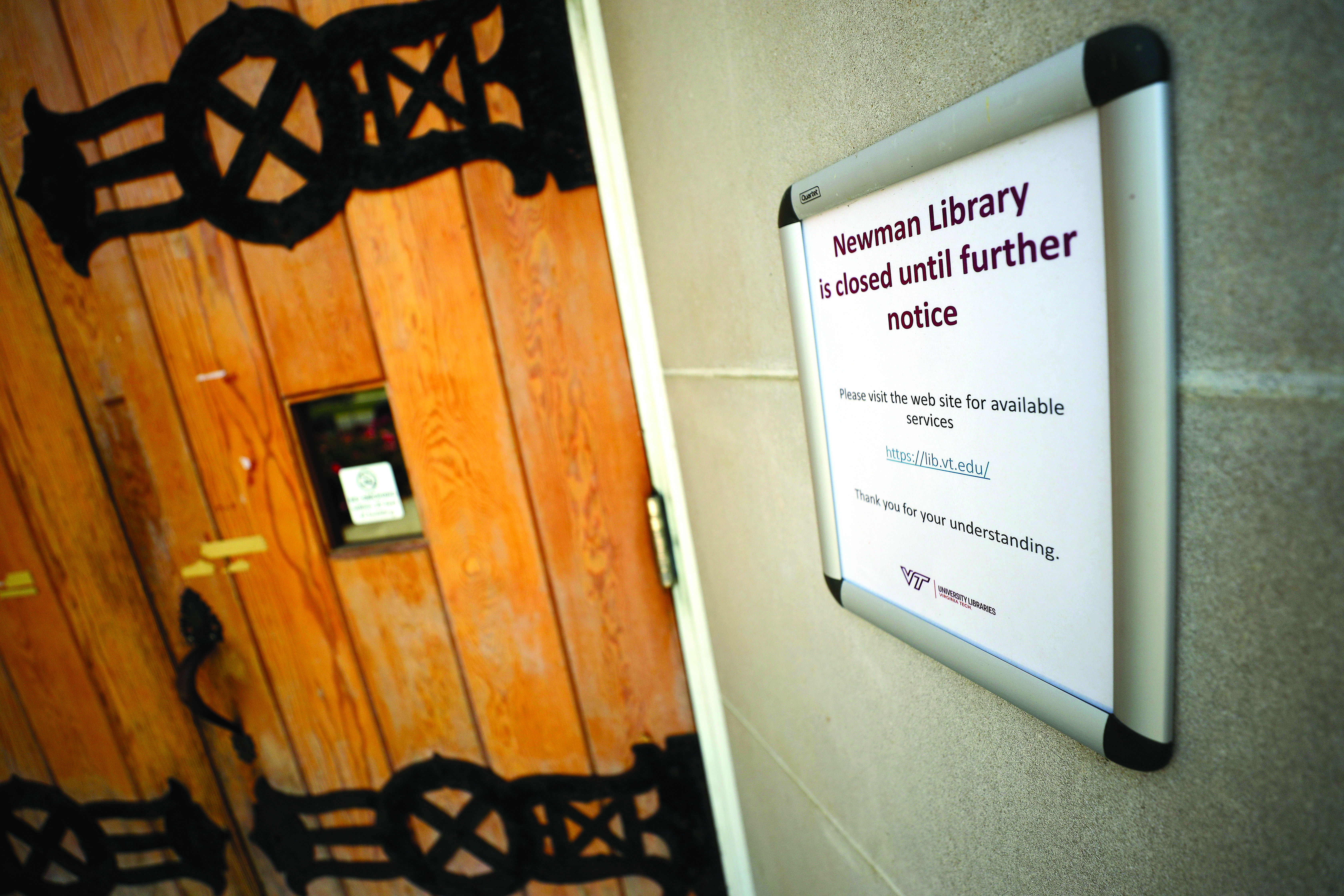
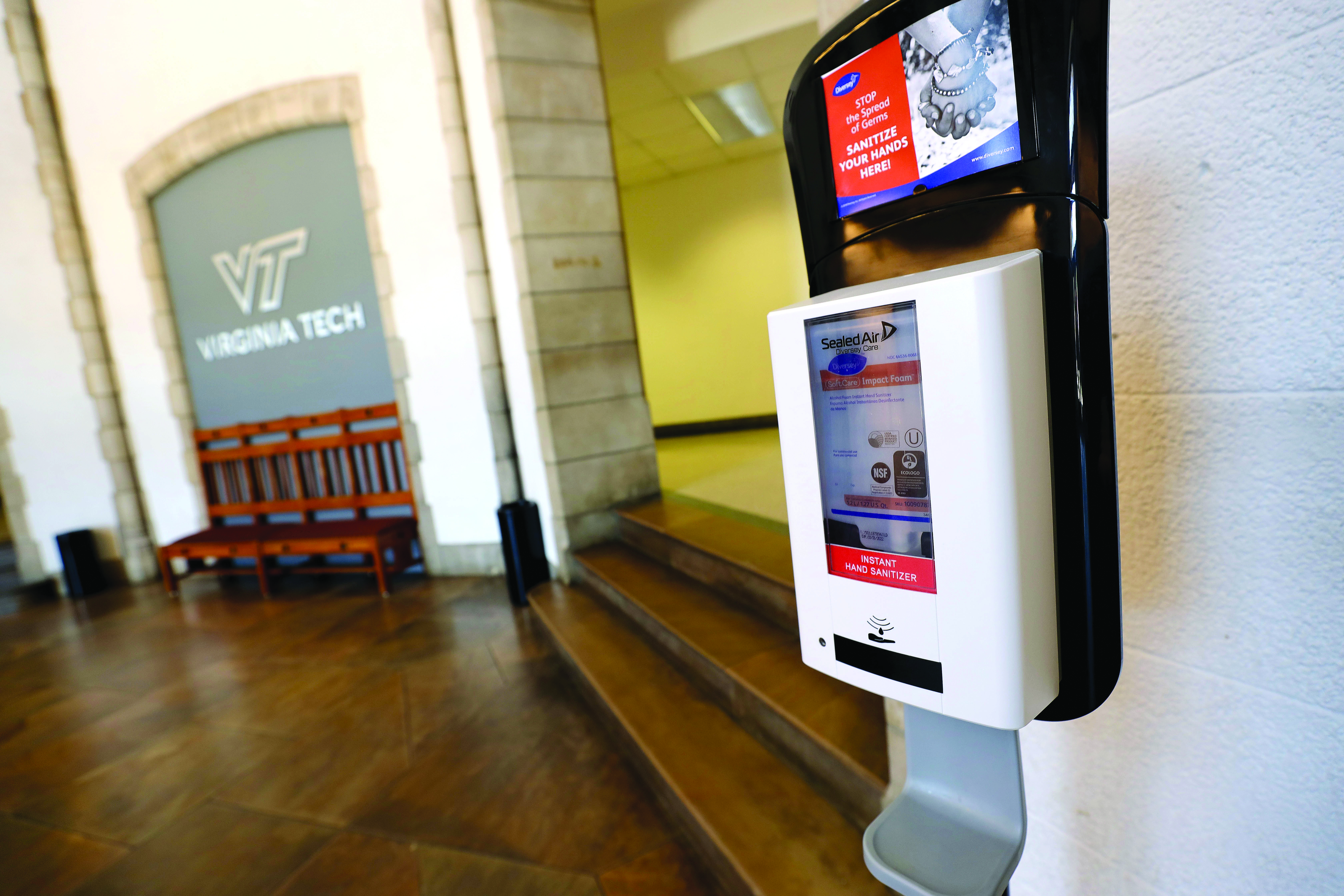
BE WELL, HOKIES
To prepare for the return of students in the fall, efforts across Virginia Tech’s campuses have focused on promoting and supporting public health recommendations. Classrooms and labs have been reconfigured, hand-sanitizing stations have been added to common areas, and university leadership has issued guidelines for pandemic etiquette. Strategically placed signage stresses the role that all Hokies play in the wellness of the Virginia Tech campuses and surrounding communities.
As members of the community, we pledge to care for the health and well-being of others by personally adopting the Community Wellness Commitment.
Because the group was able to check off certain cleaning tasks in preparation for the return of students, “once everything is back up and running, our goal will be to stay focused on and increase the cleaning frequency of high-touch areas,” said Alls.
REMOTE LEARNING
Meanwhile, Virginia Tech’s Technology-enhanced Learning and Online Strategies (TLOS) team focused on the massive task of moving classes online. Building on two decades of advancements in distance learning, it took the group less than two weeks to facilitate the academic transition, enabling more than 2,400 instructors to teach about 4,500 sections of content remotely.
“The focus was on Virginia Tech students and faculty located in various cities around the world,” said TLOS Executive Director and Associate Provost Dale Pike. “Because very little was known about what would happen, we considered many scenarios, including the possibility that we’d need to provide instruction to students who were in quarantine or support faculty who needed to teach from quarantine.”
Quinn Warnick, TLOS interim deputy executive director, credited the agile shift in part to existing online teaching tools, such as Canvas, Zoom, and Kaltura, and the faculty’s commitment to deepening their knowledge to maximize these resources.
Faced with a daunting task, Virginia Tech’s faculty and students picked up the tools available and went to work.
“We had faith that faculty of varying levels of experience with these tools would be able to successfully adjust their instruction. The other part of the equation was the commitment we had to our students,” said LuJean Baab, senior director, Learning Experience Design. “Everyone involved was willing to put in the extra effort to best benefit the students.”
Across the university, instructors not only maintained their scheduled lessons, but explored ways to apply the technology to enhance their students’ experiences. Advanced instructor of painting and drawing Betsy Bannan provided practical advice to help students create makeshift art studios in their homes. Professor of biochemistry Glenda Gillaspy turned a course’s focus to the molecular biology of SARS/COV-2, and Paolo Scardina recorded lectures from waterways around campus, using real-world examples to illustrate specific concepts and theories.
“With online education, we can now do some of the stuff that we weren’t able to do before,” said Scardina, an assistant professor of practice who teaches courses in fluid mechanics and water resources engineering. “Now I can make the classroom wherever I want.”
These are just a sample of the many innovative ways Virginia Tech’s faculty members raised the bar in continuing to provide a world-class education and an exemplary student experience during one of the university’s most challenging times.
Students took notice of that extraordinary effort, according to Madelynn Todd, a rising senior and the 2019-20 undergraduate student representative to Virginia Tech’s Board of Visitors.
“They are really great people who took the input of the students very seriously,” said Todd of the university's pandemic response. “I think it really speaks volumes about our administration.”
As the board representative, Todd, who is studying animal and poultry science, often heard student concerns, and she fielded dozens during the spring semester.
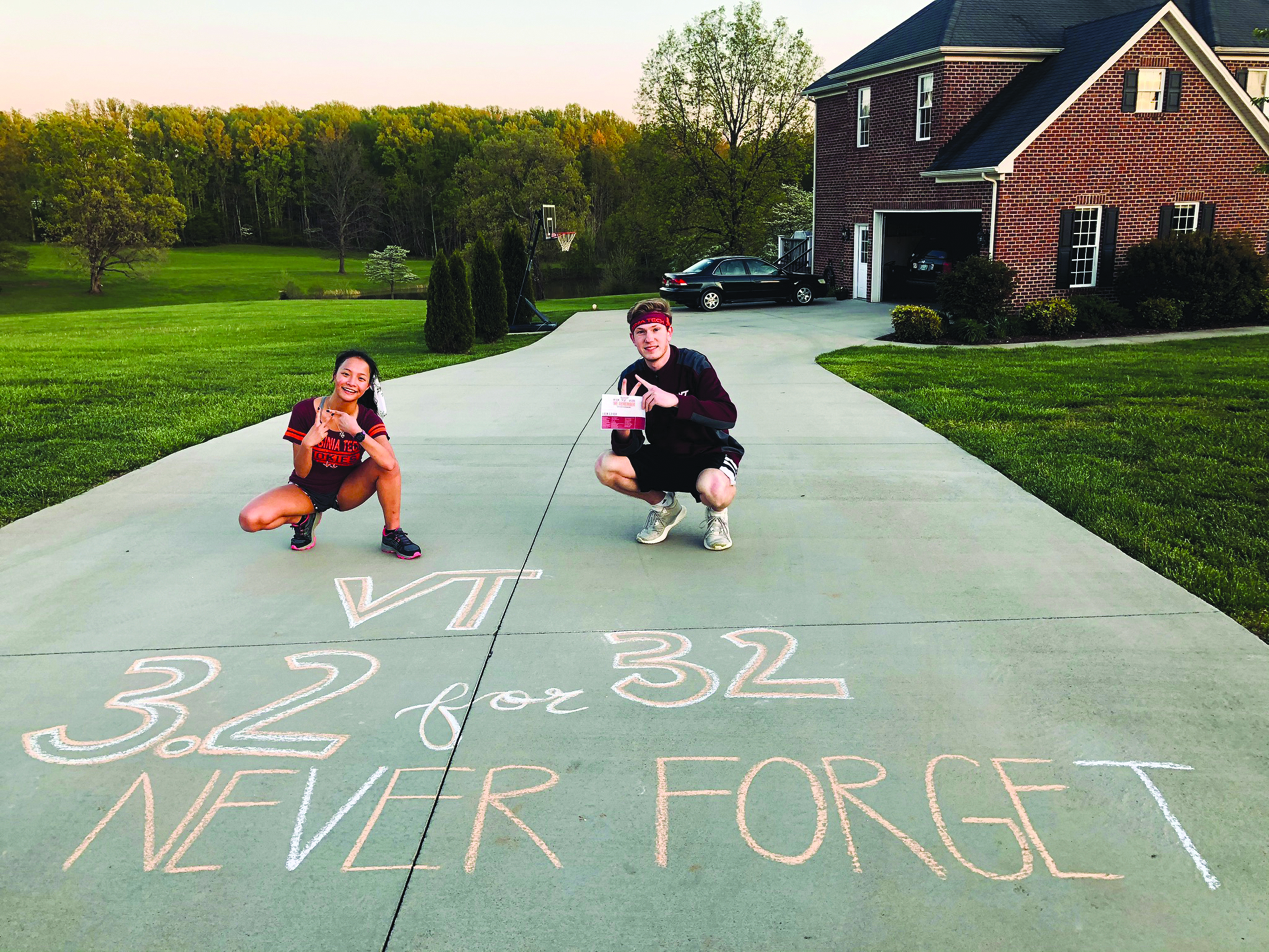
COVID-19 affected not only academics, but every facet of student life. For some Virginia Tech athletes, the pandemic derailed their last opportunity to reach new heights as Hokies. This included point guard Taja Cole, who helped move the women’s basketball team to its best record in 14 years, at 21-4, before the NCAA Tournament was canceled, and four-time All-American wrestler David McFadden, who had a national title in his sights.
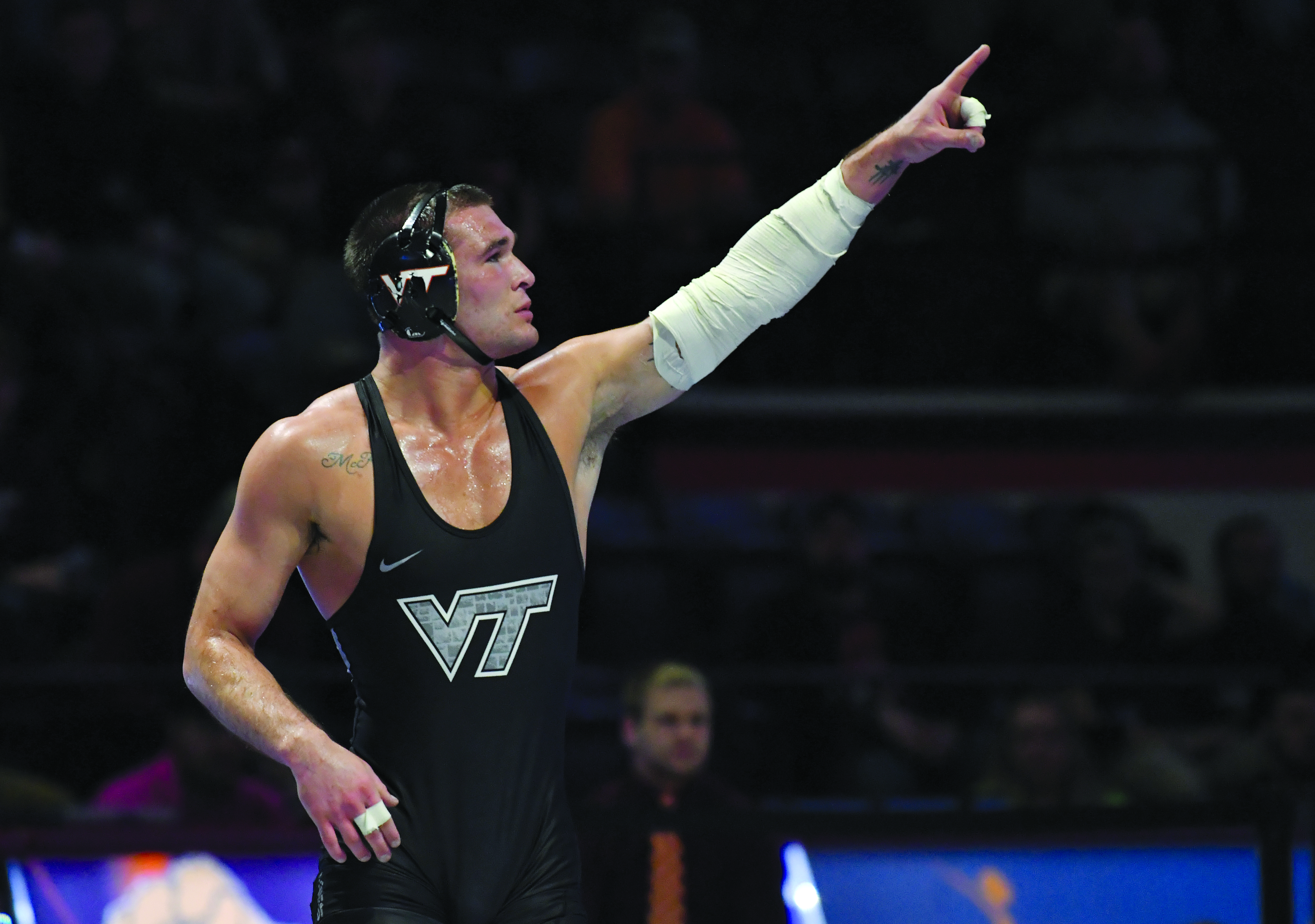
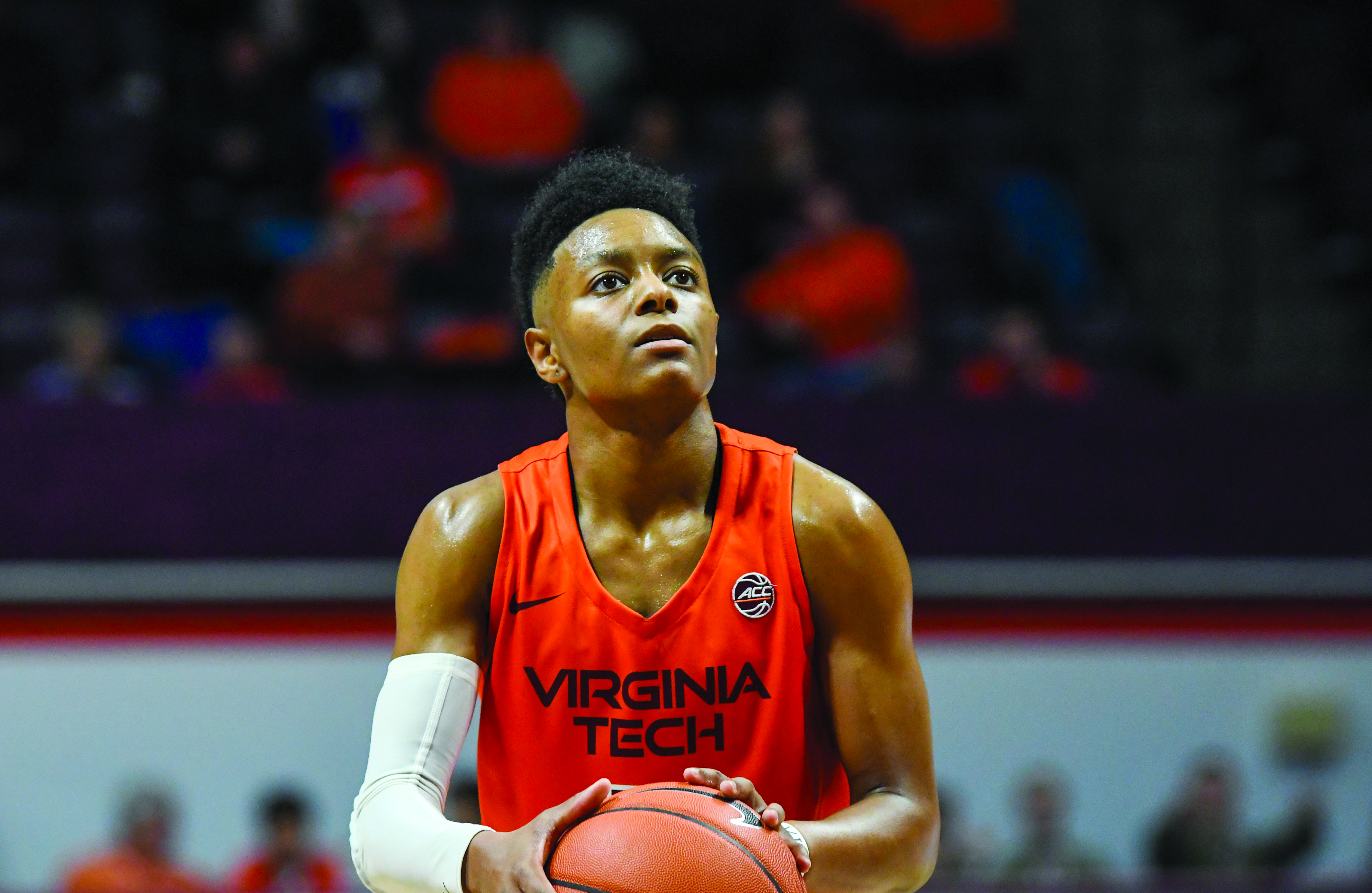
RESILIENCE
Student leaders, like Madelynn Todd (top), who served as an undergraduate representative on the Virginia Tech Board of Visitors, and athletes like David McFadden (center) and Taja Cole (bottom), whose final collegiate sports seasons were cut short, maintained positive attitudes and demonstrated resilience in the face of numerous challenges and disappointments this spring.
“I have a feeling that something good is going to come out of all this. It just has to,” said McFadden.
Though disappointed, McFadden said he saw the missed opportunity as simply doing his part to fight the spread of the virus.
“You know, there’s a lot worse things than missing a party or something, and this thing is really serious,” McFadden said. “But I have a feeling that something good is going to eventually come out of all this. It just has to.”
Echoing Virginia Tech’s core mission of service, that type of response was common among students, even through the tension of the nontraditional semester, according to Todd.
“During this time, I think Ut Prosim was at its highest, even though we weren’t all together,” she said. “We weren’t going to let this crisis break this community.”
CONNECTED VIRTUALLY
There is perhaps no more visual example of the resilience of the Virginia Tech community than the annual 3.2-Mile Run in Remembrance, an event held to recognize the 32 individuals who lost their lives on April 16, 2007. Each April, thousands of Hokies trek to Blacksburg to join with the Hokie community for the solemn occasion.
By mid-March, organizers and participants alike knew that the traditional annual Blacksburg event would need to be modified to control the spread of the coronavirus. In true Hokie form, the Virginia Tech community created an inspirational alternative.
The run, which typically begins and ends around the Drillfield, was swiftly converted into a virtual event, and Hokies around the globe were invited to join via the Stridekick app. Participants accessed the app to log their Run in Remembrance miles.
According to the official statistics recorded over a three-day period, more than 11,500 participants from four continents logged more than 81,000 virtual miles.
The run was just one of a myriad of online events that encouraged Hokies to come together, lean on one another, and interact with the university community even though face-to-face interactions were restricted.
Virginia Tech stepped up to keep the university community across the country and around the globe informed not just of campus updates, but of evolving state and federal guidelines via electronic communications, PSAs, social media posts, news releases, and other media. Faculty experts from a wide range of departments shared their perspectives via newspaper stories and appearances on network and cable news shows. University and regional leaders conducted a series of town halls to answer questions, dispel misinformation, and convey the most up-to-date data available regarding a variety of COVID-19-related topics. And previously scheduled events moved online to accommodate the physically distanced landscape embraced by much of the world.
“As Hokies, it’s our community that sets us apart, and it's during these unprecedented times that we need each other more than ever,” said Charlie Phlegar ’78, M.A.Ed. ’87, vice president for advancement at Virginia Tech. “At a time when getting together in-person wasn’t possible, it was important for us to keep Hokies around the globe informed and united by staying connected.”
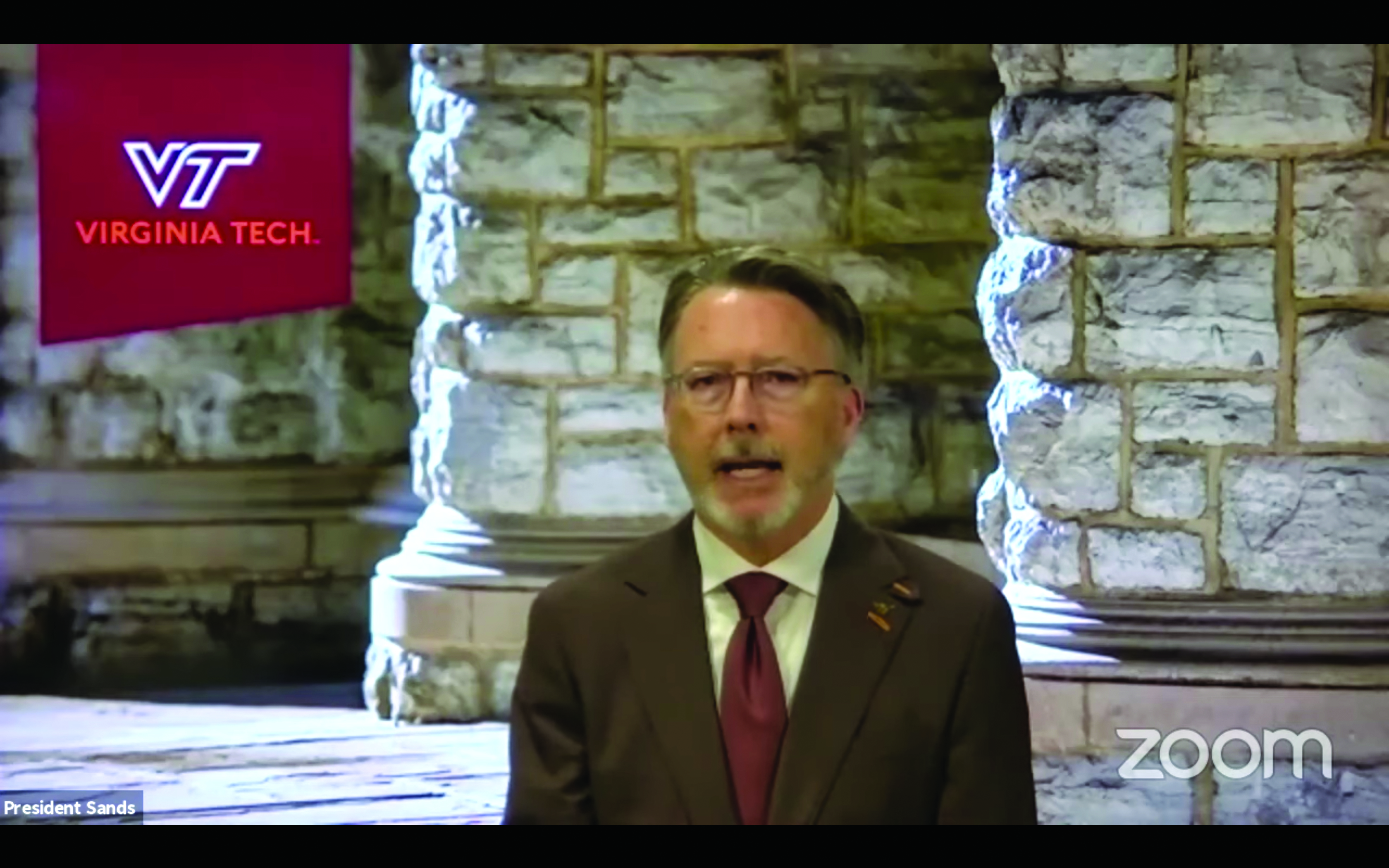
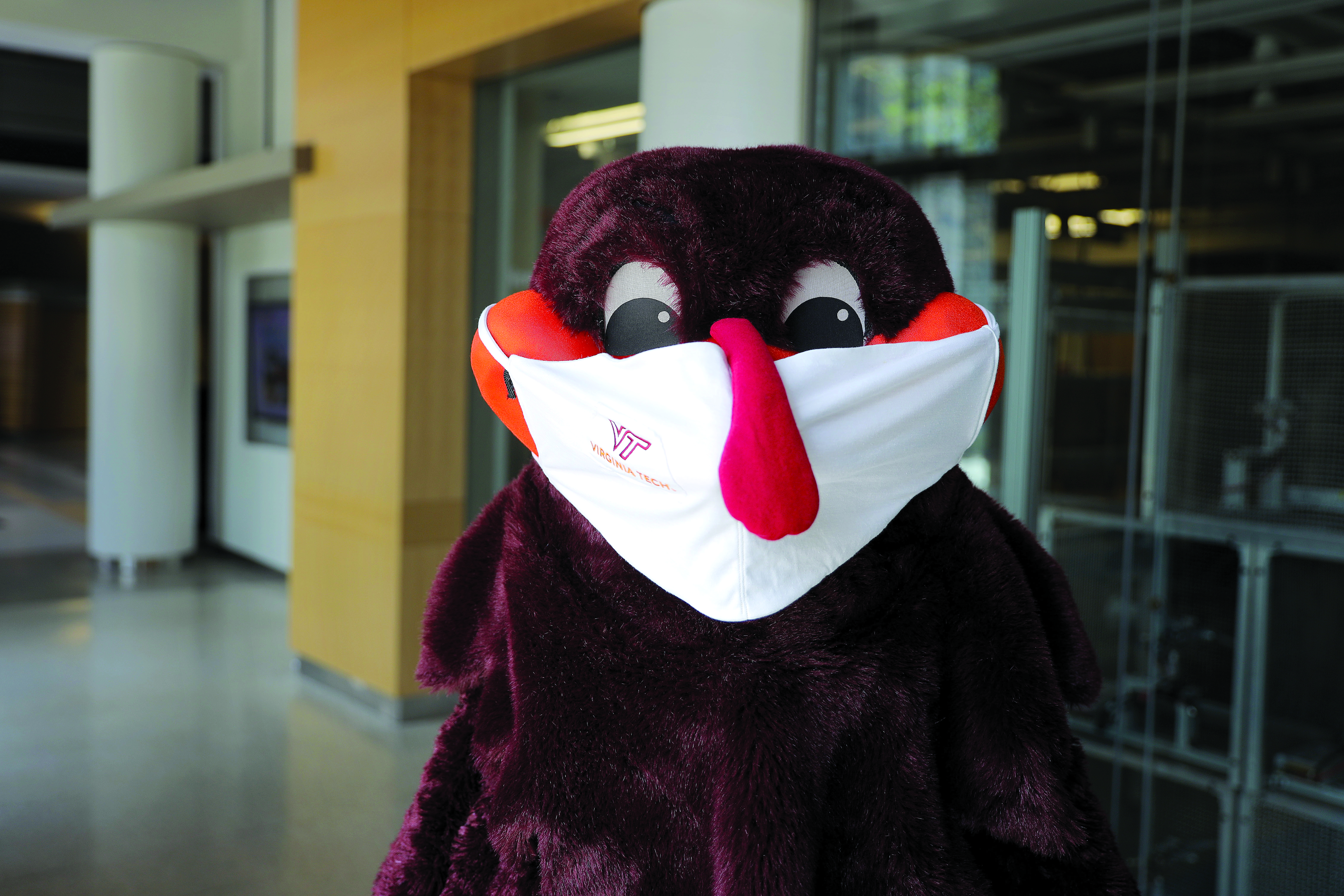
IN THIS TOGETHER
For alumni, students, and friends of Virginia Tech, being a Hokie means joining a family net work that spans the globe. Staying connected during the pandemic involved creativity and patience. University leaders hosted virtual town halls to keep the community informed. Virtual options for events like the Run in Remembrance brought Hokies together in new ways. Student organizations held meetings online and used social media, video, and the internet for every thing from origami instruction to outreach for elementary school chemistry projects. Although Hokies couldn’t be side-by-side in their favorite place, their virtual connectivity reinforced that we are all in this together.
Student Affairs, Human Resources, and other departments partnered with University Relations to publish information related to health, economics, and general life during a pandemic. Virginia Tech mental health professionals and support groups used a total of 132 secured Zoom accounts to provide an average of 250 hours per day of counseling and other services.
Hokies around the world boosted outreach efforts and worked hard to keep people connected. Student organizations moved meetings and events online. The annual student-led Relay for Life expanded from a 24-hour event to a week full of informational and social programming that set the bar for virtual relays held at colleges and universities across the nation. Parents, alumni, and other volunteers even transformed University Libraries’ Cheesy Nights—a service project-turned-Blacksburg campus-tradition that distributes grilled cheese sandwiches and other treats during finals week—into a virtual, at-home event.
Therese Walters, also known as the Grilled Cheese Lady, is married to University Libraries Dean Tyler Walters. She initiated the Cheesy Nights tradition and has played an integral part in coordinating the project since 2011. According to Walters, going virtual was meant to tap into some of the students’ emotional memories and nostalgia. She supplied a simple, fun how-to video and encouraged parents to treat their students during exam week.
“I’m sure there were plenty of students saying, ‘Man, right now I’d be at the library and when you walk in, it smells like cooking skillets,’” Walters said. “It’s just like the ‘chicken soup for the soul’ thing.”
Alicia Stoltzfus, the parent of a rising junior at Virginia Tech, took the event to the next level, packaging and delivering DIY grilled cheese kits—containing items for sandwiches, hot chocolate, and more—to students living in and around Winchester, Virginia. During finals week, Stoltzfus and a group of volunteers, including fellow student mothers Amy Stock and Nancy Vining, made 15 deliveries within a 70-mile area. The volunteers announced their arrival at each home by blasting “Enter Sandman” through a Bluetooth speaker.
“As soon as they [the students] heard the music, every single one of them started jumping,” Stoltzfus said. “We got messages afterwards from parents saying, ‘This is exactly what my Hokie needed.’”
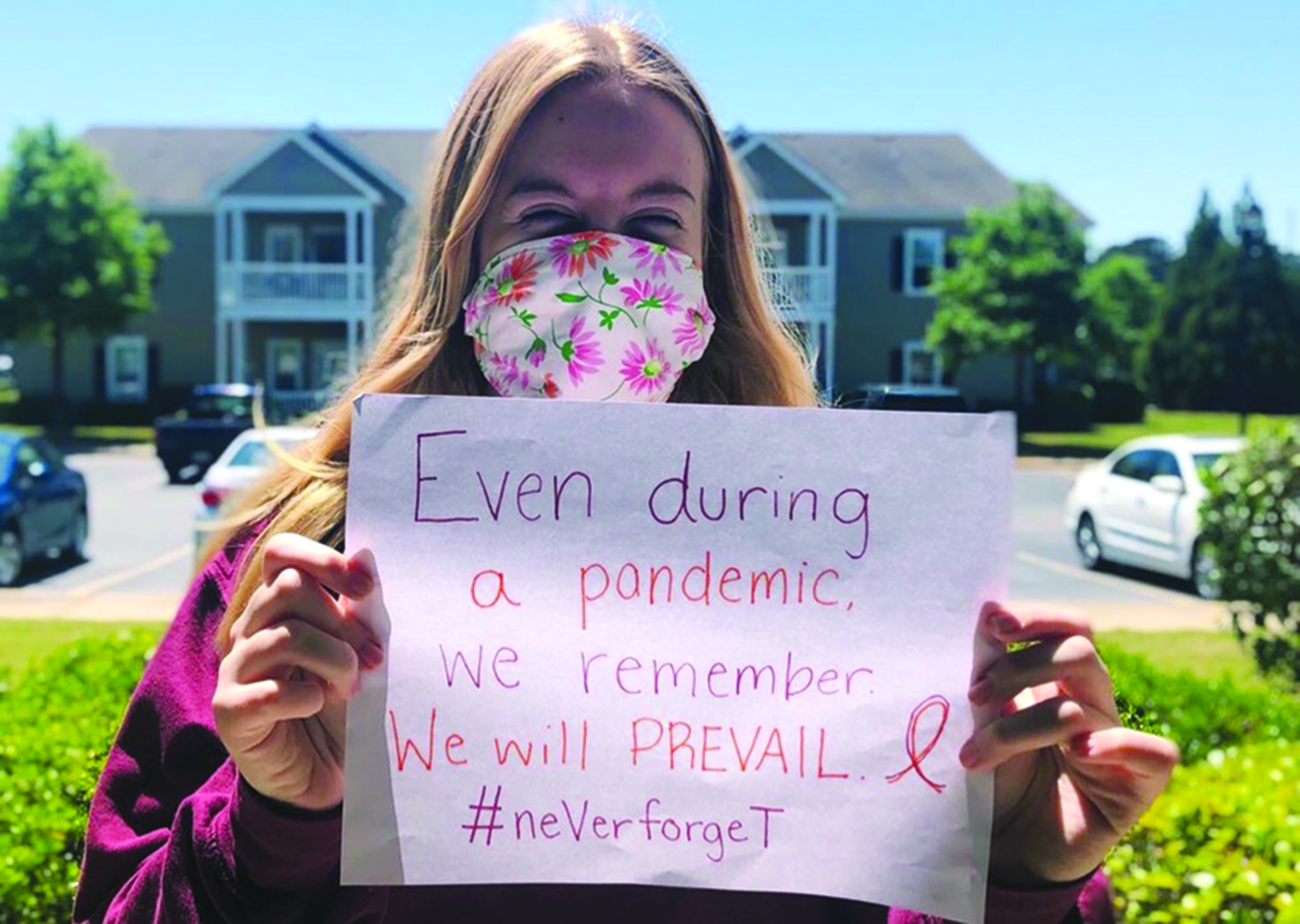
THAT WE MAY SERVE
As a public land-grant university, Virginia Tech prioritizes teaching, research, and outreach that meet the needs of our surrounding localities, state, nation, and world. The university’s dedication to that mission has perhaps never been more evident than during the COVID-19 pandemic.
Virginia Tech researchers and scientists responded to the dire need for rapid testing by developing a new test and securing government approvals to process samples in Blacksburg and Roanoke. Enterprising students and employees used their skills to create thousands of face shields and implement projects to fund and secure resources to address shortages of critical equipment and supplies. The Blacksburg campus hosted a federal personal protective equipment (PPE) decontamination site, one of only three in Virginia.
With offices in 108 counties and cities across the commonwealth, Virginia Cooperative Extension (VCE) often stands at the forefront of education and service outreach. When the pandemic and resulting shutdown began to disrupt life, VCE disseminated a wide range of information on topics, ranging from health and safety to grocery shopping, food planning and recipes, and stress management. Later, Extension agents produced online embryology courses, virtual cooking contests, and livestock showcases.
“Extension is here to serve the commonwealth at all times, and we strive to address the new challenges in our communities by providing convenient and powerful resources for them, wherever they may be,” said Ed Jones, director of Virginia Cooperative Extension. “Our agents are incredible resources who continually work to be beacons of light for communities across the commonwealth.”
VCE also held its annual Southwest Virginia Bull Test Program virtually. The auction routinely brings more than 350 beef cattle producers together each year. This year, 115 bulls and seven heifers were sold for a total of $381,950.
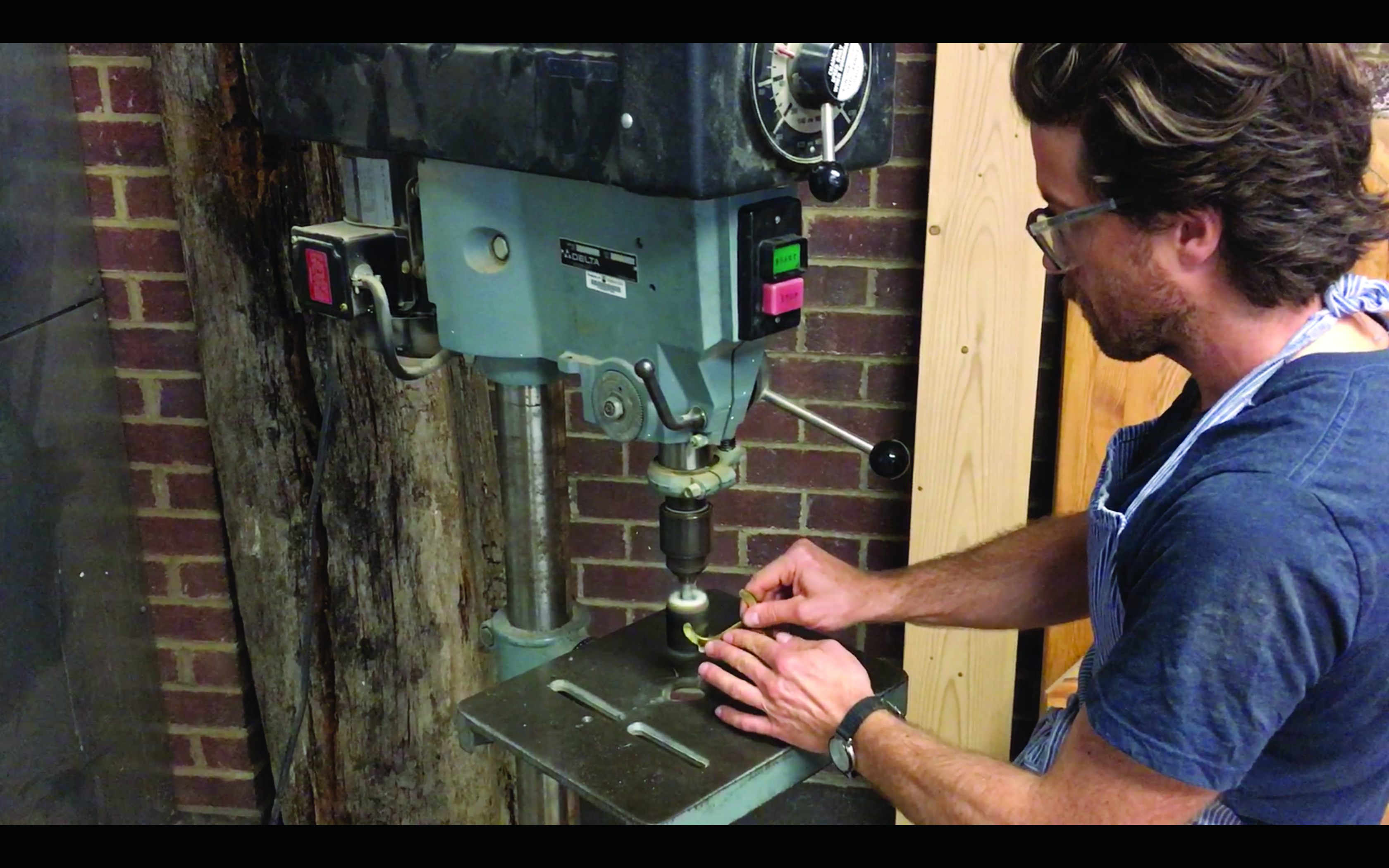
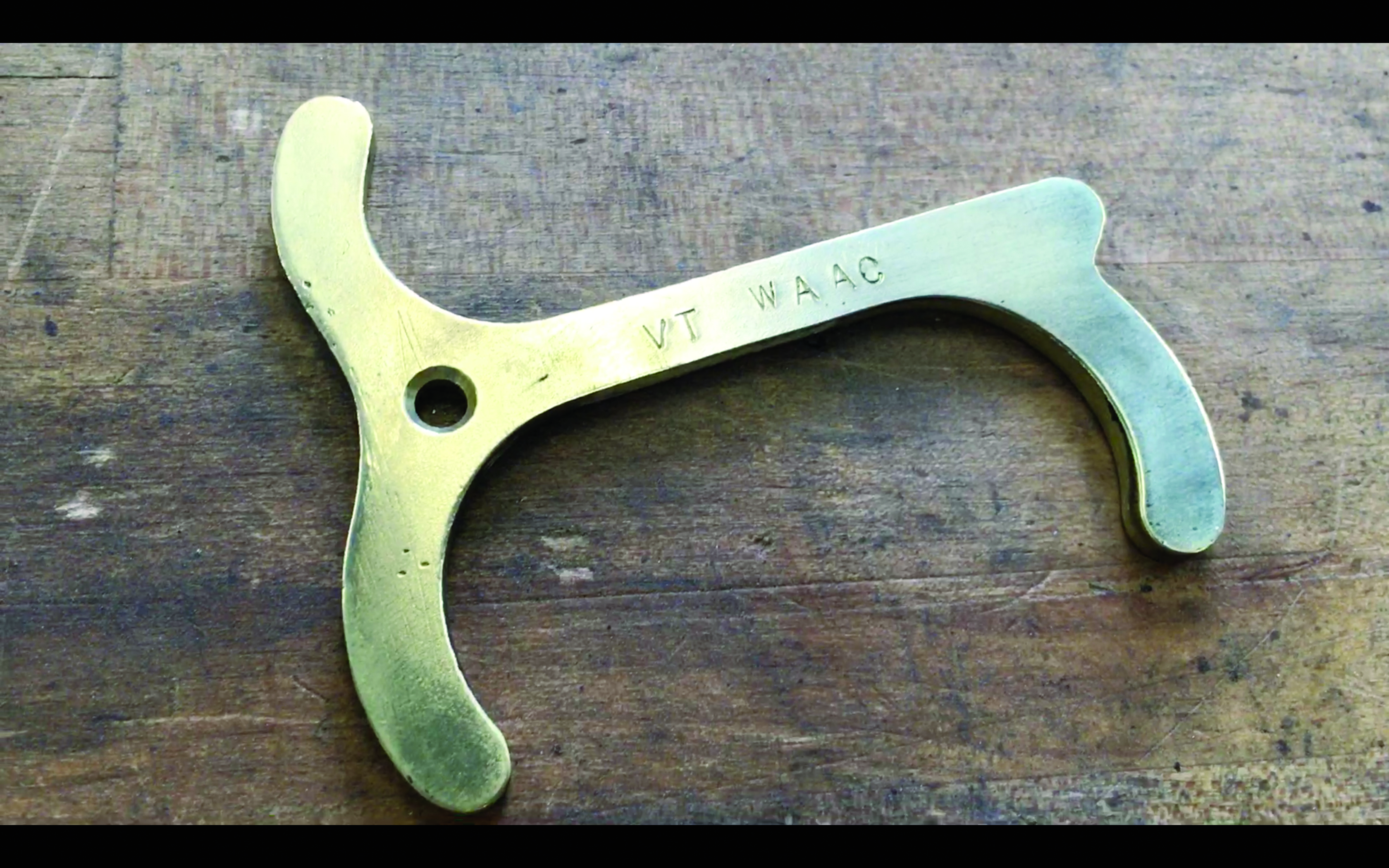
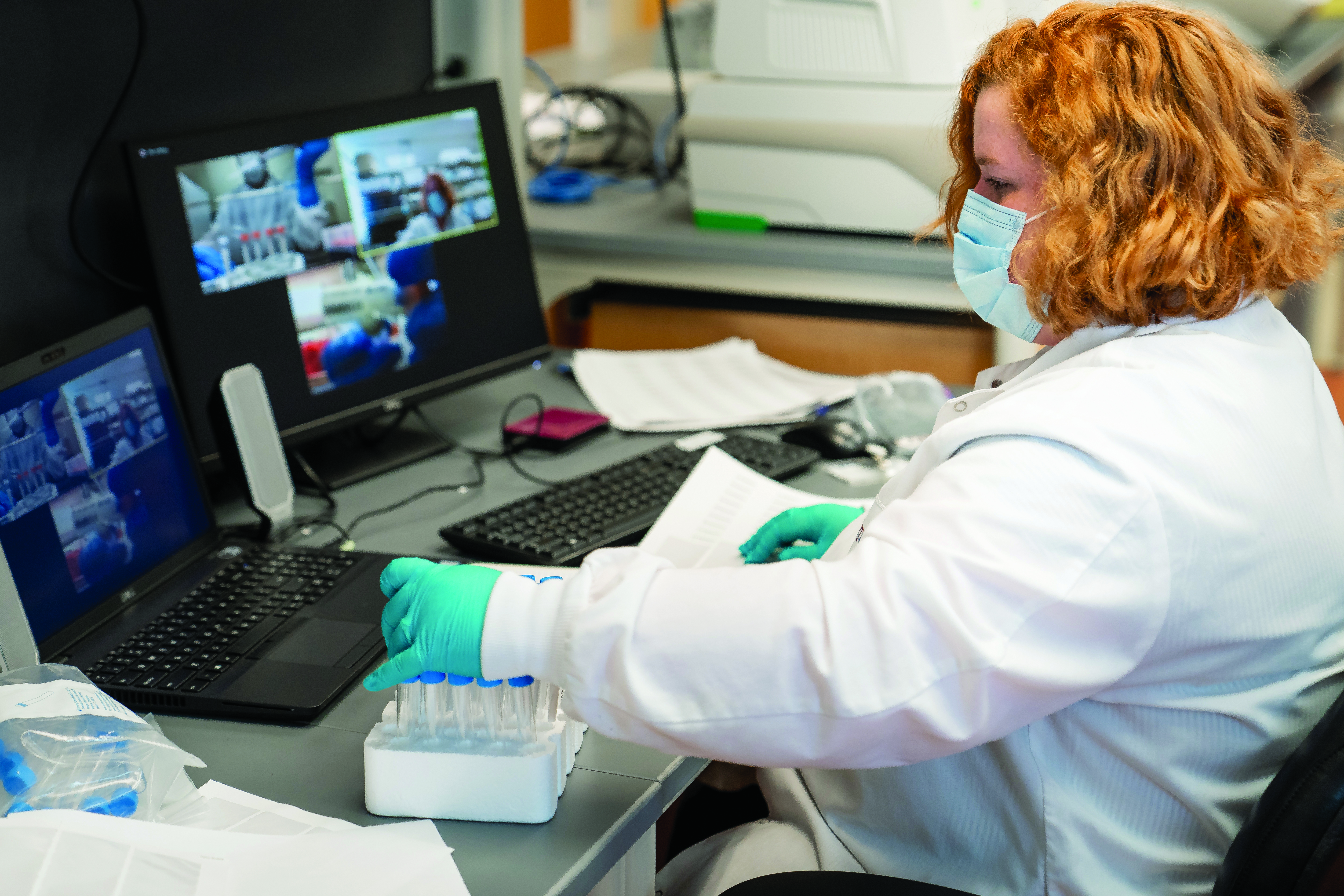
SOLUTIONS
From the greater Washington, D.C., metro area and Roanoke to Blacksburg and beyond, the Virginia Tech research community worked tirelessly to develop and implement testing (above), make personal protective equipment, alleviate shortages of supplies and medical devices, find alternative treatment methods, and support the efforts of public health officials in their regions. Ryan Pieper (top), an associate collegiate professor who teaches and oversees the workshop facilities at Virginia Tech’s Washington-Alexandria Architecture Center, created an open-source design, which is available online at no charge, for a tool (middle) to assist with opening doors and pushing buttons.
With fewer people on campus, the university’s Dining Services scaled back operations; however, Campus Kitchen at Virginia Tech, which typically preserves unserved food for nonprofit agencies, continued to help fight hunger in the New River Valley, delivering more than 10,100 pounds of food to community organizations during March, April, and May.
Across the country, Virginia Tech alumni stepped up, serving on the front lines of the medical field, helping educators navigate options for remote learning, and lifting spirits and raising funds through a variety of projects, from making and sharing origami crafts with children and senior citizens to organizing online dance parties. When Chris Kopec ’00 first had the idea to take his DJ service online, his plan was intended to entertain his family, who were feeling a little restless after being confined at home. Much to Kopec’s surprise, the first event, broadcast from the basement of his home, garnered more than 20,000 views in two hours and eventually, more than 1.4 million. It inspired the DJ to continue offering weekly dance parties and to use the platform to raise funds for various charities. From March through May, Kopec’s virtual events raised more than $1 million.
“Ut Prosim was really the way I was brought up,” Kopec said. “I think that’s part of why I loved Virginia Tech so much while I was there.”
RISING TO THE MOMENT
Virginia Tech’s Roanoke campus continues to provide critical support in responding to the coronavirus pandemic. The Fralin Biomedical Research Institute at VTC led an effort with the Fralin Life Sciences Institute to conduct COVID-19 testing in Roanoke and Blacksburg, providing consistent, reliable results at a time when Virginia was struggling to deploy more tests across the state.
A professor of medicine at the Virginia Tech Carilion School of Medicine partnered with Carilion Clinic and Virginia Tech engineers to upgrade bilevel positive airway pressure (BiPAP) machines, commonly used for sleep apnea, into makeshift ventilators, helping to relieve potential ventilator shortages. The medical school has also committed volunteer support for contact-tracing with the Medical Reserve Corps in Virginia.
And, just a few hours away, in the greater Washington, D.C., metro area, the pandemic is shaping the still-emerging Innovation Campus.
When the outbreaks escalated in early March, Lance Collins had recently been named as the Innovation Campus’s inaugural executive director. Rather than preparing for his move to Alexandria, he found himself scrambling at Cornell University, where he was wrapping up a decade-long stint as dean of its College of Engineering.
Now, as he prepares to lead Virginia Tech’s newest campus, Collins feels that the university’s mission in the world has become even more relevant and urgent than it was just a few months ago.
“Virginia Tech’s dedication to service and its emphasis on interdisciplinary teams put it in an ideal position to effectively respond to this pandemic, to adapt to changing conditions, and to build upon the lessons that we’re learning during the process,” Collins said. “The Innovation Campus is taking shape during this historic moment and will no doubt be influenced by the pandemic and our response for decades to come.”
The pandemic is an encompassing crisis that demands the best of us. But then again, Hokies have always risen to challenges.
